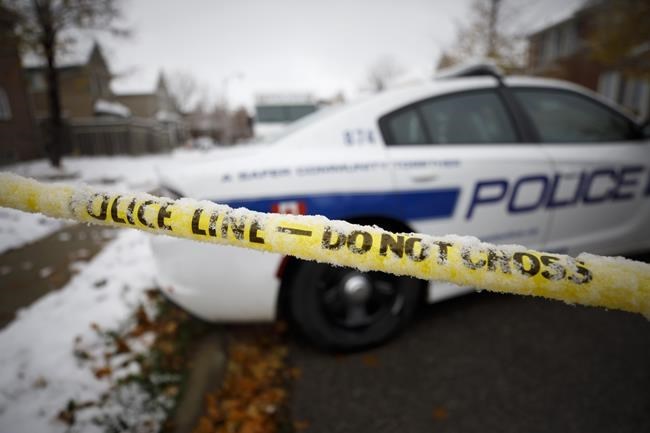MONTREAL — More than three dozen people gathered at a north Montreal funeral home Sunday to pay their last respects to a man few in attendance had ever met.
Fritznel Richard, 44, was found dead in a wooded area in St-Bernard-de-Lacolle, Que. earlier this month, and provincial police have said they believe he likely died of hypothermia while trying to enter the United States.
Richardson Charles Alida, one of the few at the funeral who knew Richard, said the Haitian asylum seeker was alone in Montreal and wanted to reunite with his wife in the U.S. He also believed he would be able to get legal status there.
"I think he wanted to have legal status as well, because here he still didn’t have a work permit and he didn’t have his (permanent) residence,” Alida said in an interview.
Alida, who met Richard while shopping in a convenience store, said he didn't have time to get to know him well but remembers him as kind.
"I could see the beauty, the wisdom, the kindness that was in his heart. He was someone who loved people," he said.
Alida, who is also a Haitian asylum seeker having fled the country due to threats he faced following a run for elected office, said people like him and Richard need to be able to work to pay rent and buy food for their families, or send money back home.
Frantz André, a spokesman for a Montreal-based group that helps undocumented people, said Richard and his family struggled to find affordable housing in Montreal after a perilous journey to Canada that took them through several other countries.
"They arrived here, in a country that calls itself welcoming and where democracy reigns, to die here, in 2023. Is this our welcoming land?" he said during the funeral.
André, with the Comité d’action des personnes sans statut, said in an interview before the funeral that Richard's wife, Guenda Filius, has relatives in the U.S. and went to stay with them due to her health.
Richard had planned to work in Montreal and send money to his family, but wasn't able to do so, he said.
André said Richard leaves behind an 18-month-old son in Florida and a 11-year-old son who is still in Haiti.
André, who said he sees a growing number of asylum seekers leaving the country, said the Canadian and Quebec governments need to do a better job of making asylum seekers feel welcome, do a better job of issuing working permits and help people find affordable housing.
"Give them a fair chance to prove that they deserve to be protected by Canada," he said.
André said he'd also like to see the end of the safe third country agreement, which bars asylum seekers coming from the U.S. from entering Canada at official border crossings.
Filius watched the funeral on Zoom, unable to enter Canada after abandoning her asylum claim.
Tears frequently streamed down her face as she watched. Overcome with emotion, she was unable to speak when her turn came.
Richard's death led to an outpouring of solidarity by members of Montreal's Haitian community.
Frédéric Boisrond said funeral services company Magnus Poirier, whose Montreal-Nord location often serves the Haitian community, donated many of its services, while his family paid the rest of the costs.
He never met Richard and said he likely never would have, but he wanted to humanize him so that he would not just be remembered for the way he died.
"We are living in the same city, we are living in the same country, we are responsible for each other. And what happened to him, when I look at it, I only say to myself, 'it could have been me, it could have been you,'" he said in an interview. "This is our responsibility, to take care of each other."
Boisrond, who immigrated to Canada from Haiti when he was 12, said he worries asylum seekers don't know about the resources available to them and may fall prey to scams.
Richard's body was found near an unofficial border crossing at Roxham Road, where he originally crossed into Canada.
An RCMP post has been set-up at the crossing, where asylum seekers are systematically intercepted by police.
The RCMP intercepted 39,171 asylum seekers in Quebec in 2022 -- more than 99 per cent of all asylum seekers found crossing the border between official points of entry.
This report by The Canadian Press was first published Jan. 22, 2023.
Jacob Serebrin, The Canadian Press


